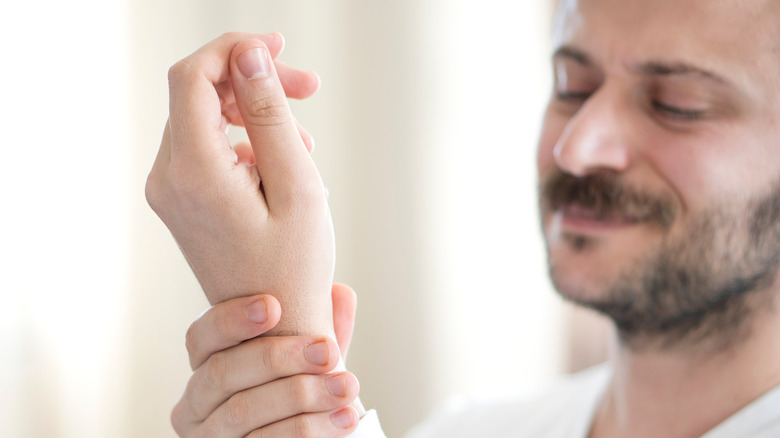Being Left-Handed Has An Unexpected Effect On Your Joints
In some ways, being left-handed may give you the upper hand — pardon the pun. Making up approximately 10% of the population (via Scientific Reports), lefties reportedly excel when it comes to verbal skills (via The Guardian) and are said to dominate the world of boxing, fencing, and other certain athletic activities (via BetterHealth Channel).
Left-handed individuals may also reap some unique health benefits. For one, they may be less prone to certain health conditions, such as Parkinson's disease. Compared to right-handed people, lefties have also been shown to heal more quickly from brain trauma, reports Healthline. Not only that, but being left-handed may also put you at a reduced risk for arthritis. Rheumatoid arthritis (RA) occurs as a result of joint inflammation. As an autoimmune disease, this ongoing inflammation can lead to joint damage. Repetitive motions can exacerbate symptoms of arthritis, and research shows that this tends to occur in relation to one's dominant hand. Even for those who are left-hand dominant, however, the risk still seems to be lower.
Left-handedness and reduced prevalence rates of arthritis
In a 2011 large-scale study published in Laterality, researchers analyzed more than 1 million participants to determine whether or not a link existed between left-handedness and three specific health conditions: allergies, ulcers, and arthritis. No relationship was observed between left-handedness and allergies. When it came to ulcers and arthritis, however, a connection was seen between left-handedness and lower rates of both conditions. Because genetics is thought to play a role in hand dominance, the study team theorized that these same genes may potentially be involved in the relationship between left-handedness and reduced rates of ulcers and arthritis.
Another theory was explored in the previously mentioned 2016 study published in Scientific Reports, in which greater joint involvement was seen in right-hand dominant rheumatoid arthritis patients compared to joints on their non-dominant side (in this case, the left). More significant joint destruction due to erosion was also seen on the participants' dominant side, indicating that the increased involvement of these joints may be partially responsible. Although this same relationship existed between left-hand dominant RA patients and greater joint involvement, it was not deemed statistically significant. Because the study had a number of limitations, however, no definitive conclusions can be drawn. Only 4% of subjects included in the research were left-handed. Therefore, future studies with a larger sample size are still needed.
Managing the discomfort of arthritis
Regardless of whether you're right-handed or left-handed, there are ways to help manage the discomfort of arthritis. Experts at the Mayo Clinic suggest stretching, walking, or cycling in order to keep your joints active; maintaining proper posture; and ensuring you give your body plenty of rest. Weight management and refraining from smoking can also help alleviate arthritis pain. Oppositely, certain exercises can aggravate arthritis symptoms. This includes tennis, jumping, running, and more. These activities tend to place added repetitive strain on our joints and are therefore best avoided.
The use of a heating pad or certain over-the-counter (OTC) pain-relief medications can also be helpful for short-term relief. Ibuprofen, acetaminophen, and naproxen may be used sporadically, as well as certain arthritis pain-relief creams. Alternative treatments, such as acupuncture or massage, may also be beneficial. Be sure to consult with your doctor in developing a treatment plan.



